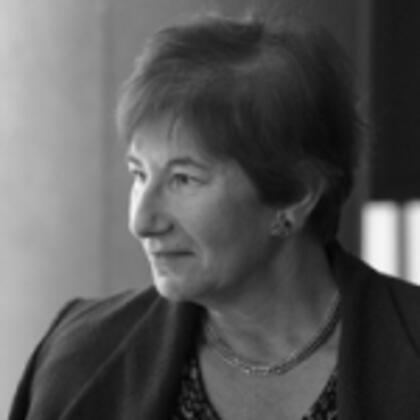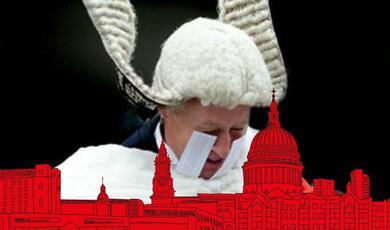Choosing your baby
Share
- Details
- Text
- Audio
- Downloads
- Extra Reading
How IVF and embryology have developed to enable would-be parents to use embryo diagnosis to select an embryo free of an inherited disease. We will question whether this has an adverse effect on attitudes towards the disabled. How do we draw the line between eugenics and doing the best for the unborn child? The advantages and disadvantages of choosing the sex of a baby, and attitudes in other countries. In future might it be possible to select the child's traits through embryo selection? The new law on this will be explained.
Download Text
CHOOSING YOUR BABY
Professor the Baroness Deech DBE
Preimplantation genetic diagnosis (PGD)
Despite its name, the technique of preimplantation genetic diagnosis involves no genetic manipulations or alterations. It is a way of selecting embryos from amongst a group naturally created by the union of egg and sperm from the would-be mother and father. It involves the removal of a cell from an embryo at the 8-cell stage and the testing of that cell for the presence of a chromosomal or molecular disorder. Once an embryo has been found that does not have the disorder, it may be replaced in the womb with the intention of establishing a normal pregnancy. PGD is used by couples who are otherwise fertile, but where there is known to be a risk in the family of an inherited genetic condition that is detrimental to health. This selection of embryos, which permits the making of a choice about the characteristics of the next generation, is the one that has been met by responses such as "playing God" and "eugenics." It has provoked arguments about reproductive freedom, the welfare of the baby and the treatment of the disabled.
The advantages of PGD are the ability to avoid inherited genetic disorders and diseases, to avoid sex-linked diseases (such as Duchenne Muscular Dystrophy) by selecting a baby of the unaffected sex, and, as described in the last lecture, to enable a new baby to be a tissue donor for a seriously ill sibling, if PGD is coupled with tissue typing and matching. The process is not perfectly accurate in diagnosis and it is still possible for a child to be born with the disease in question despite laboratory biopsy, because the one cell removed for examination did not reveal the problem. Removing two cells might make diagnosis more certain, but there is a fear that to remove two cells from an embryo of eight cells might damage it. PGD started in the UK and is carried out thousands of times a year worldwide. It is estimated that about 1000 babies have been born after PGD since about 1990. There are some doubts expressed about the total safety of the procedure, but since confidentiality makes follow-up difficult, there is no evidence; some studies have shown no problems in babies born this way.
The arguments against PGD are that it leads to destruction of the unsuitable, hence that some humans are unsuitable to live, and this is where the fear of eugenics is expressed. So new legislation in Italy and Germany prohibits PGD by prescribing that all embryos must be transferred into the woman and that not more than three may be created. Thus there are none left to test. Those who believe that full human rights start at conception will of course be opposed to PGD. It is also seen as discriminating against the disabled, and disabled groups have launched vigorous arguments against PGD - although at the same time calling for the right to select by PGD embryos bearing the disability of their parents so that the child shares the same condition.
I attach little consequence to the argument that the chosen child is a commodity, or made to order, because every choice made by a man and woman in reproducing has some element of this. The choice with whom to breed, the time and conditions of doing so, the care extended by a mother to her baby in the womb, all of these are attempts to shape the future of the unborn child and almost invariably intended for the better.
As far as eugenics is concerned, the word bears a terrible history, going back to Pharaoh and the Hebrews in Egypt. It equates to the introduction into the race of a desirable trait, or the prevention of birth of those regarded as undesirables. It is well known that under the Nazis a regime of one perfect physical type was pursued by forced sterilisation and denial of reproductive rights. This is not the same, by any means, as PGD. Some countries have adopted PGD as a national policy. There is a considerable number of persons with beta thalassaemia in Cyprus. Embryos of carriers and engaged couples themselves are screened to see if they are carriers and the prevalence of the disease has in consequence been reduced.
Another sensitive area where PGD is useful, is to tackle the problem of birth defects arising from consanguineous marriages, mostly marriages between first cousins, sometimes double cousins, prevalent in the Islamic world. Beta thalassaemia is one of those diseases: children affected by it require blood transfusions throughout their lives, and the transfusions themselves may lead to damage to major organs. This damage has to be controlled by further procedures every night for five or six days a week. Survival is unlikely beyond the second decade. Education about genetic diseases, genetic counselling, premarital screening and PGD are essential in those countries affected.
Other diseases found in populations where there is a lot of cousin marriage include blindness, hearing impairment, deafness, congenital heart disease and sickle cell anaemia. The percentage of first cousin marriages is reported by WHO to be 37% in Pakistan, 32% in Jordan, 30% in Iran, 31% in Saudi Arabia, 30% in the UAE and 29% in Iraq. Populations who migrate to the West from those countries bring the practice with them, or rather they import cousins from the homeland for marriage. The custom arises from cultural and historical reasons, not religious - it is a way of keeping finances within the wider family. Screening before marriage, when it shows that the woman is a carrier, may have its own stigma. Taboos against abortion, where the fetus is shown to be affected, are also going to prolong the problem. So PGD is a most welcome development in the countries affected, and there is no religious stricture against it.
Cyprus has a PGD centre and has been a success. In the 1970s Cypriot doctors began programmes for population screening, prenatal diagnosis, abortion and PGD, and the rate of births of babies with beta thalassaemia is now very low indeed.
In the West we accept as routine screening, albeit prenatal, for Down's syndrome and other diseases of the fetus, for which abortion is allowed. The clearest argument in favour of PGD is that it must be ethically preferable to select a disease-free embryo before implantation to aborting a pregnancy because it has been discovered that the fetus has an inherited condition.
Some 50 conditions have been licensed for PGD in Britain, and I name the better known: Huntington's disease, cystic fibrosis, sickle cell disease, haemophilia, early onset Alzheimer's, autosomal recessive non-syndromic sensorineural deafness, beta thalassaemia, breast cancer: BRAC1, cardiac dysplasia, juvenile retinoschisis, Lesch Nyan syndrome, muscular dystrophy, severe combined immune deficiency, spinal muscular atrophy, x-linked hydrocephalus, x-linked immuno deficiencies, x-linked spastic paraplegia.
Among Ashkenazi Jewish women, one type of breast cancer resulting from faults in two genes, BRCA 1 & 2, occurs at more than twice the rate in the general population. In Britain PGD testing licences were recently extended to the breast and bowel cancer genes, and sparked off a national debate. There were the usual religious objections, but also those who argued that selection was unnecessary. This was because breast cancer is a "late onset" disease, and by the time the sufferer is 30 she may have achieved a great deal, and a cure may have been found by then. Ranged on the other side were those who argued that to be born knowing that one is predisposed to cancer is a considerable burden to bear. "Late onset" is taken to mean the 30s and 40s, an age when men and women might be heavily occupied with building careers and young families.
Therapies for cancer have been slow to develop; and to hold out the promise of a cure is insufficient, in my view. In the UK, according to the Human Genetics Commission, 1 in 30 births involves a genetic defect, 1 in 3 blind people are so because of a genetic condition, and half of those with a severe mental disability have a genetic condition. From a pragmatic point of view, the lack of care for those affected and their families is striking, at least if one listens to the families calling for care and respite. The philosophers and believers who posit that cancer-bearing embryos should not be screened out, will not be there to provide any practical help for a family devastated by the loss of a young parent, in their 30s. To know that a way exists of avoiding this outcome and then to be forbidden to access it, is almost as harsh as the disease itself. PGD, it should be remembered, is no step towards eugenics, being a matter of choice and of screening out affected embryos, not of selecting in desirable traits.
PGD is legal in Britain, not only because it has recently been given Parliamentary approval in the 2008 Bill, but because it was permitted much earlier by the HFEA under its power in the 1990 Act. The House of Lords confirmed that this was legal in the case of R on the application of Quintavalle v HFEA [2005] 2 AER 555 (another challenge by the Pro-Life Alliance, who have fought all embryo use and testing). In this case they argued that the HFE Act permitted only the selection of embryos that were fit for pregnancy, not selection of certain types of embryos. The Lords held that the selection of embryos that were fit for a pregnancy included choice of those free of inherited disease.
The HFEA's Code of Practice sets out the criteria for which PGD can be licensed, condition by condition. It will be available only where there is a significant risk of a serious genetic condition being present in the embryo. What is "serious" is determined to some extent by the subjective view of the people seeking treatment of the condition they wish to avoid for their children, and their own previous reproductive history, for example, if they have an older child already affected. Other factors to be considered in deciding whether or not to license the use of PGD are the likely degree of suffering associated with the condition, the availability of effective therapy, the speed of degeneration in progressive disorders, the extent of any intellectual impairment, the extent of social support available, and the family circumstances of the people seeking the procedure. Each decision is taken by the HFEA in response to a clinic's request, where a couple is seeking treatment. Although the decision process is quite extended, it is swift in comparison to that which might be necessitated if there were a National Bioethics Commission or if each new gene had to be considered in new legislation. What is "serious" may change as different generations perceive suffering in different ways - we probably become less tolerant as more modern cures are on the horizon - but some conditions that were once very serious are now treatable, for example, diabetes, which hardly seems to qualify as a reason for excluding an embryo. Slow mental and physical deterioration, leading to early death, such as in beta thalassaemia or Huntington's disease, are clear candidates for the test.
Choosing a "disease free" embryo does not of course guarantee that the child will lead a disease free life, for he or she may well suffer cancer for some non-genetic reason. Moreover, a pregnancy may never come about, because there will be even fewer embryos than in straightforward IVF for implantation, once the diseased ones have been removed; it can also happen that the removal of one cell for biopsy results in damage to the embryo, so that although disease free, it is not fit for use. It is expensive, and one does not want parents to feel under pressure to conceive the healthiest of children just because the choice exists.
Disability
The most powerful arguments against PGD have come from disabled persons, albeit that cancer does not equate with disability, and that most disabilities arise after birth from accident or illness, rather than being inherited. The disabled population feels threatened, regarding disability as something that provokes unhelpful reactions rather than a bad thing in itself. It follows that disabled people believe that society should adapt to the disabled rather than the other way around. In the last resort, however, the disabled are merely offended by PGD, not harmed or additionally discriminated against. Their feeling of offence is not as serious as the damage done to those to whom PGD might be denied.
PGD involves judgments about the severity of disabilities, which disabled people find insulting and discriminatory. They see the choice in PGD as meaning that the disabled are not worthy of being born and that in future existing disabled people will be regarded by society as persons whose existence could and should have been avoided. PGD could well lead to fewer disabled people, so it is argued, with the consequence of reduced resources being devoted to them, and less power for the group. It is in fact unlikely that the numbers will fall, given that most disabilities arise after birth and also because, for social reasons, more mothers are giving birth at older ages with consequent greater risk to the baby.
Even if there were fewer disabled as a result of PGD (also unlikely, given the expense, the reduced chances of pregnancy and the stress involved), it should be noted that while there has been considerable medical progress in treating disability over the last few years, the legal and practical protection and respect afforded to the disabled has increased in parallel. The Disability Discrimination Act extends to every corner of life. It is hard to see a correlation between the avoidance of disability before the birth, and the treatment of adult disabled.
The modern emphasis on taking responsibility for one's own body illustrates an analogous risk factor for the abled: those who smoke and then develop lung cancer, those who are obese and unfit may be blamed for their conditions and denied prompt treatment, in particular infertility treatment. At the same time, Britain is a very caring and compassionate society. There is a tension here between the demand for universal health care and the growing expectation that one should take care of oneself and take steps to protect one's own health, if not that of the embryo, and this is an issue that goes beyond the availability of PGD. Embryo selection procedures are being designed with sensitivity towards the impact they might have on the disabled, thereby enabling measure to be taken to ensure that existing disabled and future born ones are not treated worse.
To argue that an affected embryo should knowingly be implanted in the same way as an unaffected one is almost as if to say that we are wrong to give treatment to those who are ill. While we give cataract operations to the sight-impaired, artificial limbs to the legless, heart and kidney transplants to those who need them, this is by no means to say that the ill are unworthy; it is simply that we do our best to help those who feel they are suffering or who suffer because society is not suitably adapted to their needs.
Public consultations have approved the use of PGD in these circumstances. Holding the line between what is a "serious" condition meriting PGD and what is not, is vital, and this is recognised by the public. For that is the line that demarcates health from eugenics, the use of the procedure for trivial conditions or to seek physical perfection and desirable traits.
The argument has also been raised as to whether families should be allowed to choose an embryo that is affected by a genetic condition. A deaf lesbian couple in the US, Candace McCullough and Sharon Duchesneau, deliberately created a deaf child by finding a sperm donor who had five generations of deafness in his family. The couple do not see deafness as a disability but as a defining part of their cultural identity, and wished to have a child who shared that nature. Such a scenario could well arise with the use of PGD for a couple both of whom bear a deafness gene, and wish to have a deaf child; or a dwarf couple wanting to select an embryo that would result in a child of their own small stature.
I think it is clear that no doctor should be expected to cooperate with the choice of an embryo that is known to be so affected. It is one thing to give a child a choice after it is born to communicate with its parents in sign language or adapt to their disability, it is another to deny the child that choice. In law, the welfare of the child is paramount, and a court could be involved if it were known in advance that an affected embryo was being sought. During the passage of the 2008 Bill, the disabled lobbied hard for the right to select a disabled embryo if the parents wanted to. Good sense prevailed. Clause 14 of the Bill prevents selection of embryos for e.g. deafness: it says that a disabled embryo is not to be preferred over a healthy one, if there is a healthy one. If the disabled couple produced nothing but disabled embryos, then they would be free to use those. The argument continued to be made, however, that this was somehow impeding reproductive liberty and undermining confidence in the deaf community, who had pressed hardest for this choice to be allowed. There is good sense in the prohibition. It is rooted in the same principle as the avoidance of eugenics: for if there was permission to choose an embryo because it is disabled, then there could be no stopping the choice of an embryo because (assuming for a moment that this was possible) it was potentially lighter skinned or blonder or more intelligent.
There is no insult intended to the disabled in striving to achieve a child with the normal complement of senses and faculties. On the other hand there is no opprobrium against mothers who continue to carry to term a fetus that has been diagnosed as defective in the womb. This is the case even though one bears in mind the considerable financial cost to society of, say, a Down's syndrome child once it is in existence. It is worth remembering that a very premature and disabled baby may be kept alive at the insistence of the parents, even though the doctors did not choose to do so and regardless of cost. The case of baby Charlotte was in the headlines in 2006, just such a baby, completely deprived of her faculties, but kept alive at the request of the parents. When the baby unexpectedly became stronger and could be taken home from hospital, it turned out that the parents were not willing to receive her at home because their marriage had ended, and the child will have to be taken into care and kept at state cost. There has been no principled objection to this outcome.
If the extraction of eggs were to become easier and the ability to test cells for a range of diseases were to increase, PGD could become commonplace. The desire of parents to do the best for their children and to have the healthiest children is too strong to be denied. Do not most mothers boast of the care they have taken during pregnancy by denying themselves treats in order to safeguard the welfare of the unborn baby? To take the use of PGD to extremes, one could get a polarisation of society into a genetically privileged elite, and an ordinary unselected underclass born in the usual way. (On this theme, see the novel The Ambassador by Edwina Currie.) If this seems unacceptable, then the argument for regulation is clear: good guidance for the clinics, counselling and licensing conditions one by one. This area will always be a worrying one, because of the great wrongs done in the 20th century in the name of the greater genetic good, whether by forced sterilisation or forbidden marriages, not only in Germany but elsewhere too. There is a genuine fear of the collective goal of social good health trampling on individual rights. And yet PGD is bound to increase, bearing in mind the speed with which society has moved to screening, where available.
Sex selection
It is not the only way to choose the sex of a baby, but the most efficient one is by PGD. One cell may be removed from a 3-day old embryo; the chromosomes and DNA are analysed and the sex determined. It is allowed for medical purposes, where a child of one sex might be a carrier of a disease, and a child of the other would not. Haemophilia and Duchenne's muscular dystrophy affect only males. It has been argued that boys are much more likely to suffer from autism than girls, and that it is inherited.
Social sex selection has been ruled out (following two public consultations by the HFEA) because of its possible demographic impact and because of issues of sex discrimination, parental preference and ethical considerations. The 2008 Bill confirms this in cl. 14, allowing sex selection only for medical reasons. A number of communities have a decided preference for boys over girls and it is not considered good practice to allow that preference to be expressed by use of PGD. We know that in China there are 117 boys to 100 girls. This coincides with the national right to only one child, a policy which might put even more pressure on parents to make sure that they got the right one. It is alleged that in India prenatal screening is used to determine the sex of the fetus and abortion may follow.
There are other more acceptable arguments in favour of sex selection. Many couples may feel that their family is only "balanced" if there are girls and boys, so that they experience both sexes. To this it may be responded that there is a mother and a father, so that a form of balance exists in any case. It may be desired to rebuild a family after the death of a child of one sex; there may be economic, religious or cultural reasons for wanting boys, e.g. to inherit the throne.
The most poignant case in recent years is that of the Mastertons. This Scottish couple lost their youngest child, a 3 year old daughter, in 1999 when she was burned by a bonfire for Guy Fawkes' night which had been lit by the four sons of the family. The couple campaigned for the right to rebuild their family with a daughter. Mrs. Masterton had been sterilised after the birth of the youngest child, the daughter, confident that her family was then complete. They applied for permission to undergo IVF treatment to seek a female embryo using PGD, basing their argument on psychological need. The HFEA expressed its intention to disallow this, were a clinic to apply for a licence on behalf of the Mastertons. In the event, no clinic did apply, and the couple sought treatment in Italy instead. At that stage Italy was unregulated. They never managed to produce a female embryo and gave away the male ones. The press was on the whole against sex selection in this publicised case. The Mastertons threatened but did not in the end pursue human rights litigation against the HFEA. One imagines that the lawyers would have advised that there was no human right to a girl, and that there was no good reason for the selection of that particular embryo under the law.
Interestingly, in Israel it is provided since 2005 that couples who want to choose the sex of their baby can apply to a committee which can give permission on a case by case basis for PGD. It will be allowed only where there are already four children of one sex in the family, and there is a risk to the emotional health of parents or child (although it is hard to imagine emotional risk to say, little boys who know that their parents are content to have boys: there might well be emotional risk in knowing that your parents are determined to go to any lengths to have a child who is not your sex because you are not sufficient.) Anecdotally there is the story of an Arab family in Israel who had 11 girls. They were the laughing stock of their village, for boys were valued over girls; and the girls were regarded as unmarriageable for it was thought that they would only produce girls themselves (in fact, the father determines the sex of the baby). This family was given permission to choose a male embryo.
©Professor the Baroness Deech, Gresham College, 20 November 2008
This event was on Thu, 20 Nov 2008
Support Gresham
Gresham College has offered an outstanding education to the public free of charge for over 400 years. Today, Gresham College plays an important role in fostering a love of learning and a greater understanding of ourselves and the world around us. Your donation will help to widen our reach and to broaden our audience, allowing more people to benefit from a high-quality education from some of the brightest minds.


 Login
Login







